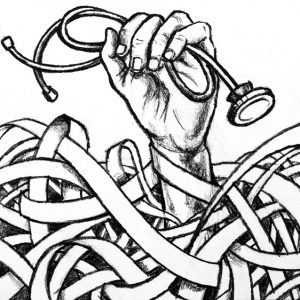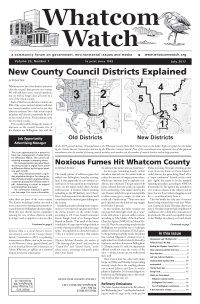by Robert A. Duke
PeaceHealth sold its Whatcom and Skagit County medical labs to Quest Diagnostics of Madison, N.J., in March 2017. This greatly disadvantages Family Care Network (FCN) patients and caregivers, because Quest labs will only automatically share test results with PeaceHealth, not with other providers. This change forced FCN to open its own lab to provide test information instantly and directly to FCN doctors for its 25,000 (2014) patients and caregivers. This burdens FCN’s patients with yet another (of which there are already too many) treatment obstacle. The startling difference between lab report contents before and after Quest replaced PeaceHealth’s medical test laboratory system is shown by two pairs of illustrations displayed in Figure 1 and Figure 2.
This PeaceHealth/Quest deal is just one more example of an increasingly common practice by corporate medicine to cut services and benefits to patients and caregivers and, in the process, burden them with yet more disjointed treatment, thus complicating and delaying care for acute conditions. This is especially heinous for terminally ill and severely disabled patients who often require more, not less, help.
FCN’s Official Response
A source at FCN, who requested anonymity, told me, “PeaceHealth made a business decision that has caused great complexity, inconvenience and confusion for patients and physicians in Whatcom County. They have caused a step back of 15-20 years.“
“PeaceHealth has sold their outpatient lab,” the source continued. “The new owners, Quest, have also made a business decision and will not be taking electronic orders or downloading their results to our (FCN) patients’ medical records. We offered them access so that it would continue the way PeaceHealth had been doing it, but they [Quest] refused. They mail or fax results to FCN. These are then scanned in to our charts as documents and are not in flow sheets where the data can be easily viewed or analyzed.”
With a bit of polished spin, FCN’s director of operations, Brian Ecker, said FCN’s new lab service would “improve quality and convenience for patients, and efficiently deliver healthcare. Reducing costs and improving turnaround time for results were additional goals,” he said in an interview reported by The Bellingham Herald on March 17, 2017. Ecker declined to be interviewed by this reporter.
FCN’s spokeswoman, Ms. Michele Anderson said in the same article, “We firmly believe our model and philosophy of care will improve the patient experience and provide better opportunities to control the rising costs of health care.”
The Deal
Ms. Anderson and Mr. Ecker must know that not all decisions can be justified on the basis of business. Business decisions rarely include empathy and compassion, two key components of caring for the sick and dying. This deal — this business decision — increased the burden and strain on patients and caregivers who now have to do additional work to get PeaceHealth to share lab results with their FCN doctors.
In the former PeaceHealth system, test results were automatically shared when two physicians collaborated in a patient’s care. Not so with Quest Diagnostics, now in the picture as I recently experienced first-hand. As soon as I found out what was going on in my personal care situation, I immediately sent the following protest email, followed by a letter to:
Timothy Sharpe, Vice President
Quest Diagnostics
3 Giralda Farms
Madison, NJ 07940
Quest Labs
Quest is the new medical lab in town and not for the better because of the added burden it places on patients and caregivers to coordinate care.
Most recently, a PeaceHealth neurologist ordered a series of blood tests for me, ones I had regularly since being diagnosed with Polymyalgia Rheumatica two years ago. Prior to Quest’s arrival both my PeaceHealth physician and my primary care physician shared test results, because they shared my care. Now, my May 30, 2017 test results are posted on the PeaceHealth portal and nothing on FCN’s In Touch patient portal.
Calling FCN about this I was advised that I must sign releases and take action to get my primary care physician copies of my lab results.
Preposterous. No patient or caregiver should have to bear such a burden in a modern and caring healthcare system.
I noticed when I had blood drawn that Quest now requires three additional pieces of paper to do what NW Labs previously did.
Robert Duke
June 2, 2017
Like many other patients, both PeaceHealth and FCN physicians treat me, and so each needs to share information with the other in order to provide me with the best of care. Shared information needs to include imaging, radiology, specialist consultation reports and laboratory test results.
If I’m outside my local system, this same information has to be shared with other systems, which in my case would include U.W. Medicine and Eisenhower Medical Center in California.
Not only do the computer information systems not talk to each other, but apparently the providers involved don’t, either. It is archaic that healthcare digital systems are incompatible, but when the humans involved decide not to cooperate with each other, things have gone too far. The obvious question in such circumstances is, “Are patient needs ever considered?”
As in other areas of life, action speaks louder than words. Despite frequent pious words from PeaceHealth, and my recent experience with Quest, the reality of its action speaks loud and clear: Patients and caregivers be damned.
With FCN patients now working harder to coordinate their own care — in order to fill the service void created by the PeaceHealth/Quest business decision — elderly caregivers and patients, the disabled and overwhelmed parents already working a second job are stressed even more.
Protest
Let your FCN providers, and in particular, Mr. Ecker and Ms. Anderson, know your thoughts on this issue through your patient portal, by phone or by mail at:
Family Care Network
3500 Orchard Pl.
Bellingham, WA 98225
Patients and caregivers, already overburdened by our fragmented healthcare system’s inefficiencies and incompatibilities, cannot afford to be drafted as errand runners in the service of cost-cutting corporate deals such as this between PeaceHealth and Quest Diagnostics. Since 2009, after a four-year immersion in our healthcare system while caring for my dying wife, I have argued for major and needed reforms. This business decision and corporate deal highlights the ceaseless erosion of care and trust between providers and those they serve.
_____________________________________
Figure 1: Lab Order Before Quest 02/08/2017.
PeaceHealth Patient Portals’ Lab Versus Family Care Network Reports.
Lab Order Before Quest 2/08/2017
My PeaceHealth Username: patientbob
Comprehensive Metabolic Panel – Detail
Component Results Component Your Value Standard Range
Sodium 136 mmol/L 135 – 145 mmol/L
Potassium 4.6 mmol/L 3.5 – 5.2 mmol/L
Chloride 100 mmol/L 95 – 109 mmol/L
CO2 30 mmol/L 22 – 32 mmol/L
Anion Gap 6 mmol/L 3 – 12 mmol/L
Glucose 88 mg/dL 70 – 99 mg/dL
BUN 23 mg/dL 6 – 20 mg/dL
Creatinine 1.00 mg/dL 0.61 – 1.24 mg/dL
GFR Non-Black (CKD-EPI) 72 mL/min/1.73m2 >=60 mL/min/1.73m2
GFR Black (CKD-EPI) 83 mL/min/1.73m2 >=60 mL/min/1.73m2
Protein, Total 6.9 g/dL 6.2 – 8.4 g/dL
Albumin 4.6 g/dL 3.5 – 5.0 g/dL
Globulin 2.3 g/dL 2.2 – 3.5 g/dL
Calcium 9.7 mg/dL 8.6 – 10.2 mg/dL
Bilirubin, Total 0.8 mg/dL 0.1 – 1.2 mg/dL
Alkaline Phosphatase 62 U/L 30 – 110 U/L
ALT 36 U/L 17 – 63 U/L
AST 30 U/L 15 – 41 U/L
Calculated OSMO 275 mOsm/kg 275 – 295 mOsm/kg
Fasting Status non Hours Hours
General Information
Collected: 02/08/2017 10:30 AM
Resulted: 02/08/2017 3:47 PM
Result Status: Final result
This test result has been released by an automatic process.
Lab Order Before Quest 2/08/2017
Family Care Network
InTouch® Patient Portal
Date 02/08/2017 10:30 AM
Summary Lab Report: COMPREHENSIVE METABOLIC PANEL
Location Family Care Network
Status Signed
Doc Id 1288
Patient: Robert A Duke
ID: AMSLIS 17BE-039C0554
Note: All result statuses are Final unless otherwise noted.
Tests: (1) COMPREHENSIVE METABOLIC PANEL (30000)
Order Note: Ordering Client: FCN WHATCOM FAMILY MEDICINE
Order Note: Copy To Provider:
SODIUM 136 mmol/L 135-145
POTASSIUM 4.6 mmol/L 3.5-5.2
CHLORIDE 100 mmol/L 95-109
CO2 30 mmol/L 22-32
ANION GAP 6 mmol/L 3-12
GLUCOSE 88 mg/dL 70-99
BUN [H] 23 mg/dL 6-20
CREATININE 1.00 mg/dL 0.61-1.24
GFR NON-BLACK (CKD-EPI) 72 mL/min/1.73m2 >=60
GFR BLACK (CKD-EPI) 83 mL/min/1.73m2 >=60
PROTEIN, TOTAL 6.9 g/dL 6.2-8.4
FASTING STATUS non Hours
Test Performed at Peacehealth Laboratories: 2901 Squalicum Parkway Bellingham, WA 98225 Note: An exclamation mark (!) indicates a result that was not dispersed into the flowsheet. Document Creation Date: 02/08/2017 3:50 PM
(1) Order result status: Final
Collection or observation date-time: 02/08/2017 10:30
Requested date-time: 02/08/2017 10:30
Receipt date-time: 02/08/2017 14:53
Reported date-time: 02/08/2017 15:47
________________________________________________
Figure 2: Lab Order After Quest 05/30/2017.
PeaceHealth Patient Portals’ Lab Versus Family Care Network PeaceHealth Patient Portals’ Lab Reports. Note that Family Care Network’s lab report is a memo and contains no lab test data.
Lab Order After Quest 5/30/2017
My PeaceHealth Username: patientbob
Anti-Jo1 – Detail
Component Results
Component Your Value Standard Range
JO-1 Antibody <1.0 NEG AI <1.0 NEG AI
General Information
Collected:
05/30/2017 10:08 AM
Resulted:
06/01/2017 1:00 PM
Result Status:
Final result
This test result has been released by an automatic process.
Lab Order After Quest 5/30/2017
Family Care Network
InTouch® Patient Portal
To Robert Duke
Date 6/5/2017
Subject Gliadin antibodies
Bob,
We received the extensive autoimmune testing ordered by Dr Koehn.
Almost everything was negative. One type of antibody called anti Gliadin was elevated. This is usually associated with celiac disease, otherwise know as autoimmune gluten intolerance.
That usually has symptoms of intestinal bloating, pain, loose stools. In rare cases it can have some neurologic symptoms .
Two other antibodies for celiac were negative but i believe the anti Gliadin is more accurate.
The only definitive way of diagnosing Celiac disease is to have an upper endoscopy with small punch biopsies of the small intestine.
If you would like, I can refer you to Dr Munson to review this with you.
Another option would be to go on a strict gluten free diet for at least two months to see if you have any improvement in any symptoms.
_____________________________________
*FCN’s new lab is operated by PACLAB Network Laboratories, NW Pathology and Clinical Microstat Systems of Renton, Washington.
Note: For my Whatcom: Chronic & Acute column about Patient Portals and exchange of physician healthcare information see the October/November 2014 issue of Whatcom Watch.
_____________________________
Robert A. Duke is author of “Waking Up Dying: Caregiving When There Is No Tomorrow,” he lives in Bellingham. His email: boshduke@gmail.com





























